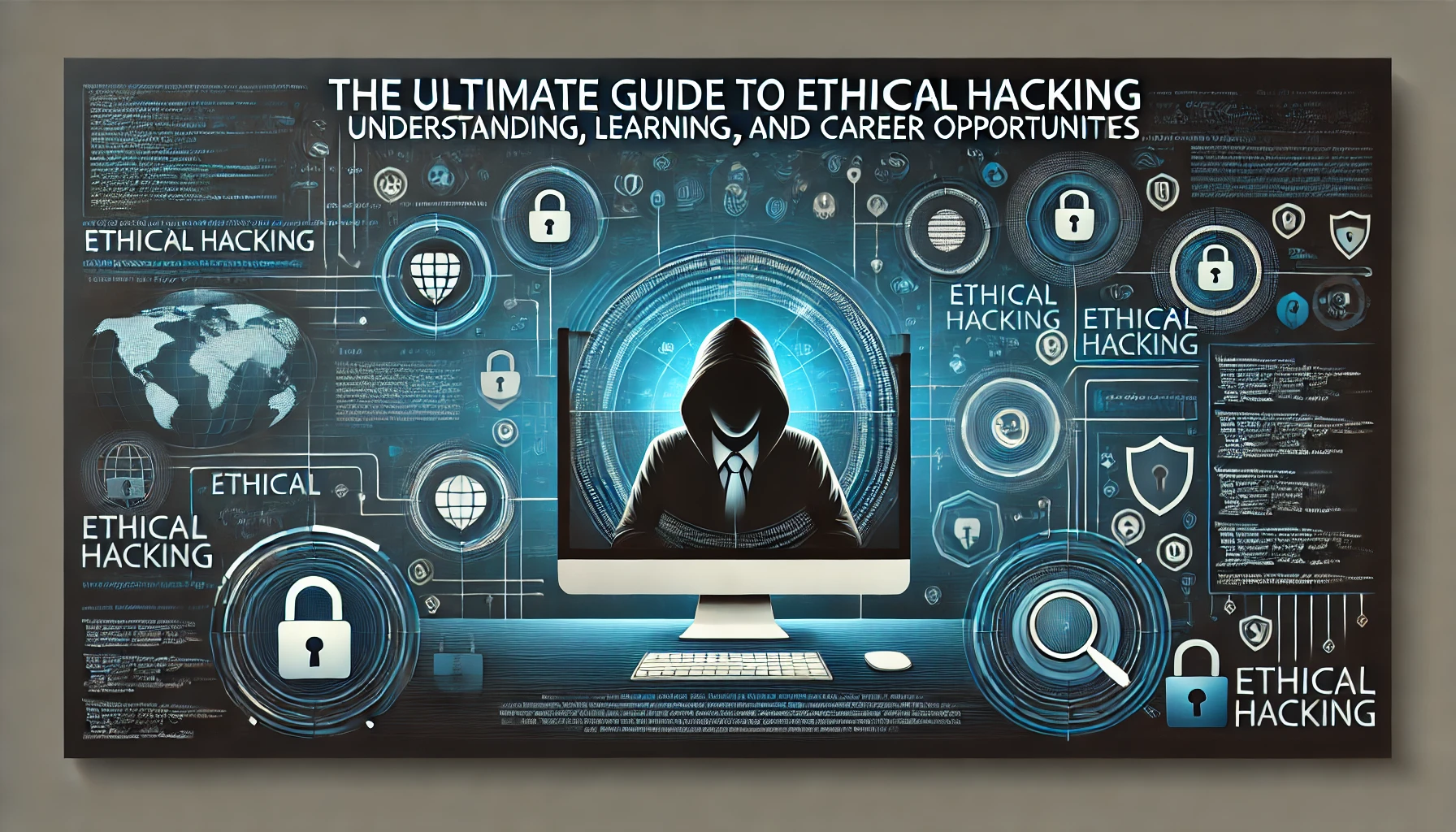Ethical Hacking: Understanding, Learning, and Career Opportunities
Ethical hacking has become an integral part of cybersecurity in today’s digital age. As cyber threats continue to evolve, the need for skilled professionals who can protect sensitive information is paramount. This comprehensive guide will delve into what ethical hacking is, the role of an ethical hacker, how to become a certified ethical hacker, the best resources for learning ethical hacking, and the various career opportunities in this dynamic field.
What is Ethical Hacking? Definition and Importance
Understanding Ethical Hacking
Ethical hacking, often referred to as penetration testing or white-hat hacking, involves legally breaking into computers and devices to test an organization’s defenses. Unlike malicious hacking, ethical hacking is performed with the permission of the owner and is aimed at improving security.
The Role of an Ethical Hacker
Ethical hackers are cybersecurity experts who understand and know how to look for weaknesses and vulnerabilities in systems. They use the same skills and techniques as malicious hackers, but their purpose is to protect and defend an organization’s data and systems. By identifying potential threats, ethical hackers help organizations to implement stronger security measures.
Importance of Ethical Hacking
Ethical hacking is crucial for several reasons:
- Proactive Defense: It helps organizations identify and fix security vulnerabilities before they can be exploited by cybercriminals.
- Regulatory Compliance: Many industries require regular security assessments to comply with regulations.
- Reputation Management: Preventing data breaches protects an organization’s reputation and builds customer trust.
- Cost Savings: Early detection of vulnerabilities can save organizations from the financial repercussions of a cyber attack.
Learning Ethical Hacking: Courses and Certifications
Ethical Hacking Course
To become proficient in ethical hacking, enrolling in an ethical hacking course is a great starting point. These courses cover various aspects of cybersecurity, including network security, cryptography, and vulnerability assessment.
Certified Ethical Hacker (CEH)
One of the most recognized certifications in the field is the Certified Ethical Hacker (CEH) certification. Offered by the EC-Council, this certification validates an individual’s skills in ethical hacking techniques and methodologies.
Ethical Hacking Certification
Besides CEH, there are other valuable certifications such as:
- Offensive Security Certified Professional (OSCP): Known for its hands-on approach.
- GIAC Penetration Tester (GPEN): Focuses on penetration testing methodologies.
- CompTIA PenTest+: Covers the latest penetration testing, and vulnerability assessment and management skills.
Learn Ethical Hacking
Here are steps to start learning ethical hacking:
- Basic Knowledge: Understand the basics of networking, programming, and cybersecurity.
- Online Courses: Platforms like Coursera, Udemy, and Regent Studies offer comprehensive ethical hacking courses.
- Certifications: Pursue certifications like CEH, OSCP, and GPEN.
- Practice: Use platforms like Hack The Box and TryHackMe to practice hacking in a legal environment.
- Stay Updated: Follow cybersecurity news and updates to stay informed about the latest threats and techniques.
Top Resources for Learning Ethical Hacking: Tutorials and Books
Ethical Hacking Tutorial
Online tutorials are a great way to learn ethical hacking. Websites like Cybrary and YouTube channels dedicated to cybersecurity provide step-by-step tutorials on various hacking techniques.
Recommended Books for Ethical Hackers
Books are invaluable resources for deepening your understanding of ethical hacking. Some must-read books include:
- “The Web Application Hacker’s Handbook” by Dafydd Stuttard and Marcus Pinto
- “Hacking: The Art of Exploitation” by Jon Erickson
- “Metasploit: The Penetration Tester’s Guide” by David Kennedy, Jim O’Gorman, Devon Kearns, and Mati Aharoni
Online Platforms Offering Tutorials
- Hack The Box: Offers hands-on hacking challenges.
- TryHackMe: Provides beginner-friendly tutorials and labs.
- Cybrary: Offers free and premium courses on ethical hacking and cybersecurity.
How to Effectively Use These Resources
To make the most of these resources:
- Set Clear Goals: Know what you want to achieve from each resource.
- Regular Practice: Consistently practice what you learn.
- Join Communities: Engage with other learners and professionals through forums and social media.
Career Opportunities in Ethical Hacking
Ethical Hacking Jobs
The demand for ethical hackers is growing rapidly. Ethical hacking jobs include roles like:
- Penetration Tester: Conducts tests to identify vulnerabilities.
- Security Analyst: Monitors and protects an organization’s networks.
- Security Consultant: Provides expert advice on improving security measures.
Skills and Qualifications Required
To excel in ethical hacking jobs, you need:
- Technical Skills: Proficiency in networking, programming, and various operating systems.
- Certifications: Certifications like CEH, OSCP, and GPEN are highly valued.
- Analytical Skills: Ability to analyze and solve complex security issues.
- Ethical Standards: A strong ethical foundation and adherence to legal standards.
How to Prepare for Job Interviews
Preparing for an ethical hacking job interview involves:
- Studying Common Questions: Understand common interview questions related to cybersecurity and ethical hacking.
- Practical Knowledge: Be prepared to demonstrate your practical skills through hands-on tests or scenarios.
- Soft Skills: Highlight your communication and problem-solving skills.
Tips for Landing a Job in Ethical Hacking
Here are some tips to help you land a job in ethical hacking:
- Build a Strong Resume: Highlight your certifications, skills, and practical experience.
- Network: Connect with professionals in the field through conferences, forums, and social media.
- Showcase Your Work: Create a portfolio of your work, including projects and practical experiences.
- Continuous Learning: Stay updated with the latest trends and advancements in cybersecurity.
Tips for Success in Ethical Hacking
- Continuous Learning: The field of cybersecurity is constantly evolving. Stay updated with the latest trends, tools, and techniques.
- Hands-On Practice: Use platforms like Hack The Box and TryHackMe to gain practical experience.
- Networking: Join cybersecurity communities and attend conferences to connect with other professionals.
- Ethical Standards: Always adhere to ethical guidelines and legal standards in your work.
Conclusion
Ethical hacking is a vital component of modern cybersecurity. Understanding ethical hacking, learning through courses and certifications, utilizing educational resources, and exploring career opportunities are essential steps for anyone interested in this field. By continuously updating your knowledge and skills, you can contribute significantly to protecting organizations from cyber threats.
For more information on cybersecurity courses and certifications, visit Regent Studies. To further explore ethical hacking and its importance, consider reading more about the topic from reliable sources and engaging with the cybersecurity community. Ethical hacking not only offers a rewarding career but also plays a crucial role in safeguarding digital information.




